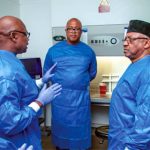IN Oyo State, 1.5 million children under the age of five are expected to be immunised against polio during a four-day Outbreak Response (OBR) campaign that starts today.
Oyo State vaccine officer, Mrs Eunice Ninilola, said the campaign will run till Sunday across 20 local governments in Ibadan, Oyo and Ogbomoso in response to the recent vaccine derived strains of Polio Virus found in Barutin in Kwara state.
Mrs Ninilola spoke at the stakeholders’ meeting of the state’s social mobilisation committee at the Oyo State Primary Health Care Board. It was to engender their support for the polio immunisation exercise that is to help boost immunity against this vaccine-preventable disease.
She stated the exercise would involve the use of house-to-house vaccinating teams, government health facilities and market places, as well as transit teams to religious houses, for the administration of the polio vaccine to children of ages less than five years, free of charge.
Mrs Ninilola stated that the first phase of the Outbreak Response (OBR) campaign had immunised 414,377 children against polio in December 2019.
Zonal Technical officer, National Primary Health Care Development Agency (NPHCDA), Mr Samuel Ajibade said the exercise was to ensure that Nigeria remains on track to been certified polio-free by June.
He declared that even with the certification, there would still be the need to continue to immunise children to sustain this achievement and ensure that polio will not resurface.
Mr Ajibade urged support of the state social mobilisation team to ensure 100 per cent immunisation coverage during the exercise.
“Even if the virus is in the environment, it will not be able to have any impact on any child that is immunised. That is why we are asking for more cooperation in the area of awareness creation so that people will receive the vaccine.
“The campaign is to achieve three things that children continue to receive OPV, create awareness that mothers access routine immunisation for other childhood killer diseases like measles at health facilities and to search for children with weakened limb or paralysis due to Acute Flaccid Paralysis (AFP).
Acute Flaccid Paralysis surveillance is the gold standard for detecting cases of poliomyelitis. The four steps of surveillance are finding and reporting children with AFP and transporting stool samples for analysis.





